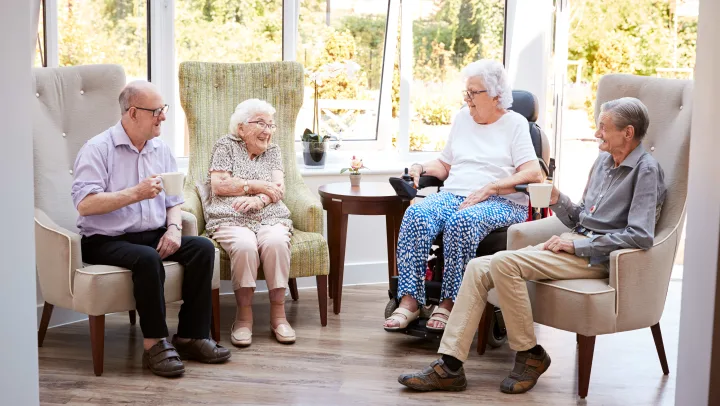Find dedicated Memory Care professionals providing personalized senior care.
Find dedicated Memory Care professionals providing personalized senior care.
Blog Article
The Role of Assisted Residing In Offering Specialized Take Care Of Dementia Clients
The arrangement of specialized care for dementia patients within assisted living centers is significantly recognized as a crucial element of efficient mental deterioration administration. These atmospheres are developed to resolve the one-of-a-kind cognitive and emotional difficulties dealt with by people with mental deterioration, using tailored assistance that advertises safety and security and health.
Recognizing Mental Deterioration Treatment Demands
Comprehending the treatment needs of people with dementia is vital for offering reliable assistance and boosting their lifestyle. Mental deterioration is a dynamic neurological condition that influences cognitive features such as memory, reasoning, and interaction. Individuals with dementia usually need assistance with daily activities, customized care strategies, and psychological assistance.
Reliable mental deterioration treatment involves acknowledging the unique obstacles encountered by each individual. This consists of understanding the phases of dementia, which can vary from mild cognitive impairment to advanced phases requiring comprehensive assistance. Treatment requires might incorporate assistance in handling daily regimens, medicine adherence, and preserving social interactions to avoid seclusion.
Additionally, sensory excitement and acquainted atmospheres can considerably enhance the well-being of individuals with dementia. Caretakers need to be trained to recognize behavioral adjustments and use strategies tailored to every person's preferences and previous experiences. Methods such as recognition therapy and memory can aid interact effectively and cultivate a complacency.
Eventually, successfully dealing with the treatment demands of people with mental deterioration calls for a thoughtful approach, continuous training for caregivers, and a commitment to maintaining dignity and regard throughout the caregiving procedure.
Benefits of Assisted Living

Assisted living promotes social interaction among residents, promoting a feeling of area and belonging. Involving with peers can alleviate feelings of isolation, which are common in those living with dementia.
Additionally, many assisted living facilities provide help with day-to-day tasks, such as drug monitoring, showering, and meal prep work. This assistance enables citizens to keep their freedom while guaranteeing their wellness and well-being are prioritized. Eventually, assisted living works as a beneficial source, stabilizing treatment and freedom for people with mental deterioration and their households.

Specialized Programs and Activities
(Memory Care Charlotte)Recognizing the unique needs of people with mental deterioration, lots of assisted living centers apply customized programs and tasks made to boost cognitive feature and promote general well-being. These programs commonly include cognitive excitement tasks Dementia Care Charlotte that involve citizens in memory video games, problems, and memory therapy, which motivates the sharing of individual tales and past experiences.
Additionally, art and songs therapy play significant duties in cultivating creativity and psychological expression (Assisted Living). Involving citizens in painting, crafting, or songs sessions can give restorative benefits, assisting to reduce anxiety and improve state of mind. Exercises, such as mild workouts and dance sessions, are likewise important, as they advertise wheelchair and physical health and wellness while urging social communication amongst citizens
Organized day-to-day routines are often developed to give a sense of stability and predictability for people with dementia. These regimens can include arranged dish times, group activities, and individualized care strategies that deal with private passions and abilities. By creating an enhancing setting full of tailored activities, aided living facilities not only improve the top quality of life for dementia individuals however additionally foster a sense of neighborhood and belonging.
Educated Staff and Support
(Dementia Care Charlotte)In helped living facilities, the presence of skilled staff is critical for supplying effective assistance to people with dementia. These specialists possess specialized expertise and skills to resolve the special demands of locals, guaranteeing their safety, convenience, and well-being. Team participants get training in dementia treatment, that includes recognizing the progression of the illness, acknowledging behavioral modifications, and using effective communication methods.
In addition, qualified personnel are geared up to apply tailored care strategies customized to every local's preferences and abilities. This personalized technique cultivates a sense of freedom and dignity, allowing residents to participate in meaningful tasks that enhance their high quality of life. The personnel likewise play an essential duty in monitoring wellness and health, without delay determining any kind of modifications in condition that might require clinical focus.
In enhancement to route care, skilled staff give emotional assistance to citizens, assisting to ease feelings of confusion and stress and anxiety that commonly come with dementia. Their caring method creates a nurturing atmosphere where locals feel valued and recognized - Memory Care. Eventually, the proficiency and commitment of skilled staff are vital in providing extensive care that meets the intricate requirements of individuals coping with mental deterioration in assisted living setups
Household Involvement and Resources
Family members involvement plays a considerable function in the care of individuals with dementia in nursing home. Involving relative in the treatment procedure not only enhances the emotional health of the resident however additionally fosters a joint atmosphere where treatment plans can be customized to private requirements. Families can offer important insights right into the preferences, history, and habits of their loved ones, which can educate caretakers and bring about even more personalized treatment approaches.
Additionally, helped living facilities commonly offer resources for families, such as support teams and academic workshops. These sources can assist families understand mental deterioration, enhance interaction approaches, and create coping systems. Involvement in these programs can encourage family members, outfitting them with the tools required to support their enjoyed ones efficiently.
Additionally, routine interaction in between households and staff is crucial. This recurring dialogue allows families to remain informed concerning their enjoyed one's progression and any type of changes in care strategies. Ultimately, a strong collaboration in between households and aided living facilities cultivates a setting of trust and understanding, guaranteeing that people with mental deterioration obtain the specialized treatment they are entitled to while keeping their family members connections.
Conclusion
Finally, helped living facilities play an essential function in resolving the unique demands of dementia patients with individualized care and support. By fostering secure settings, promoting social communication, and implementing structured routines, these facilities boost the overall well-being of citizens. The participation of experienced personnel and families further improves the treatment experience, making certain that specific choices and histories are valued. Inevitably, assisted living offers vital resources that significantly enhance the lifestyle for those dealing with dementia.
Report this page